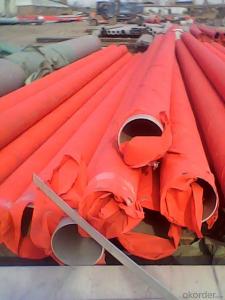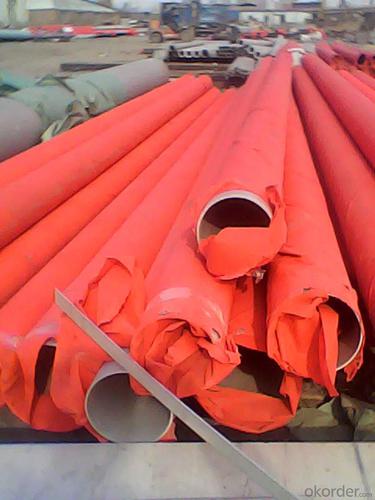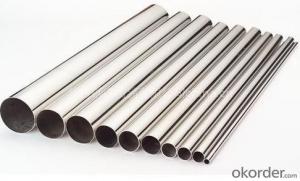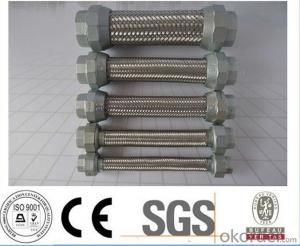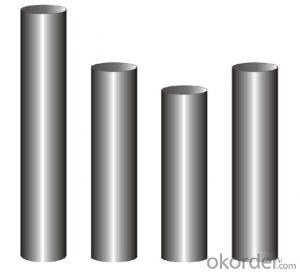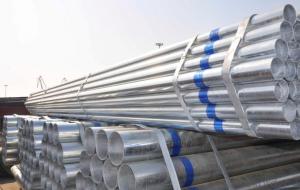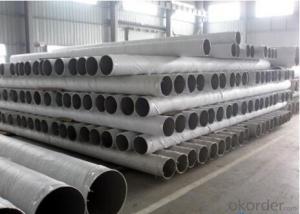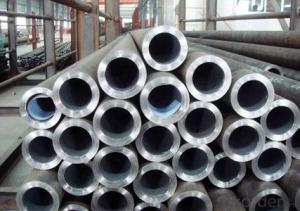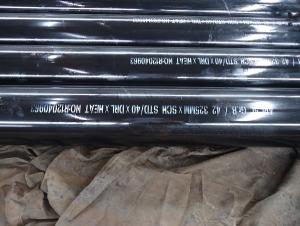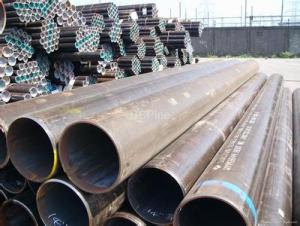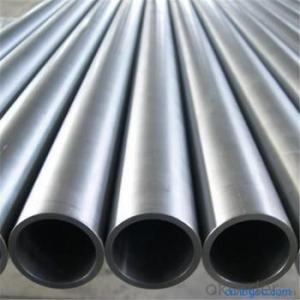PVC Coated Stainless Seamless Steel Tube
- Loading Port:
- Tianjin
- Payment Terms:
- TT or LC
- Min Order Qty:
- 25 m.t.
- Supply Capability:
- 10000 m.t./month
OKorder Service Pledge
OKorder Financial Service
You Might Also Like
We are company that have many years experience and professional manager team and engineer team and sales team, sure we will provide you high quality of pipe and professioanl service.
Seamless pipe possesses a hollow section and without seam around the strip steel. It is made with solid bar or steel ingot by perforating machine. As the facture process does not include any welding, seamless pipes are considered to be stronger and more durable. Generally speaking, seamless pipe has better pressure resistance and security than other classifications, and was usually more easily available than welded pipe.
2、Main Features of the Seamless Pipe:
• High working accuracy
• High strength
• Small inertia resistance
• Strong therming dissipine ability
• Good appearance
• Reasonble price
3、Seamless Pipe Specification:
Standard | GB, DIN, ASTM ASTM A106-2006, ASTM A53-2007 |
Grade | 10#-45#, 16Mn 10#, 20#, 45#, 16Mn |
Thickness | 8 - 33 mm |
Section Shape | Round |
Outer Diameter | 133 - 219 mm |
Place of Origin | Shandong, China (Mainland) |
Secondary Or Not | Non-secondary |
Application | Hydraulic Pipe |
Technique | Cold Drawn |
Certification | API |
Surface Treatment | factory state or painted black |
Special Pipe | API Pipe |
Alloy Or Not | Non-alloy |
Length | 5-12M |
Outer Diameter | 21.3-610mm |
Grade | 20#, 45#, Q345, API J55, API K55, API L80, API N80, API P110, A53B |
Standard | ASME, ASTM |
1) Material:20#(ASTM A 106/A53 GRB.API5LGRB,GB),45#,16Mn,10#.
2) Specification range: OD: 21.3-610mm, WT:6-70mm, length:6-12m or according to the requirement of clients.
3) Executive standards: GB, ASME API5L.ASTM A 106/A53,Despite of the above standards, we can also supply seamless steel pipe with standard of DIN, JIS, and so on, and also develop new products according to the requirements of our clients!
4) Surface: black lacquered, varnish coating or galvanized.
5) Ends: Beveled or square cut, plastic capped, painted.
6) Packing: bundles wrapped with strong steel strip, seaworthy packing.
4、Packaging & Delivery:
Packaging Details: | seaworthy package, bundles wrapped with strong steel strip |
Delivery Detail: | 15-30days after received 30%TT |
5、FAQ of Seamless Pipe:
①How is the quality of your products?
We have many years business experience in this area, and we have professional engineer and manager team and sure we can provide you high quality production and professional service.
②How about price?
Yes, we are factory and be able to give you lowest price below market one, and we have a policy that “ for saving time and absolutely honest business attitude, we quote as lowest as possible for any customer, and discount can be given according to quantity”,if you like bargain and factory price is not low enough as you think, just don’t waste your time.Please trust the quotation we would give you, it is professional one.
③Why should you chose us?
We can give you both.Additionally, we can also offer professional products inquiry, products knowledge train(for agents), smooth goods delivery, exellent customer solution proposals.Our service formula: good quality+good price+good service=customer’s trust
SGS test is available, customer inspection before shipping is welcome, third party inspection is no problem.
6、Seamless Pipe Images:
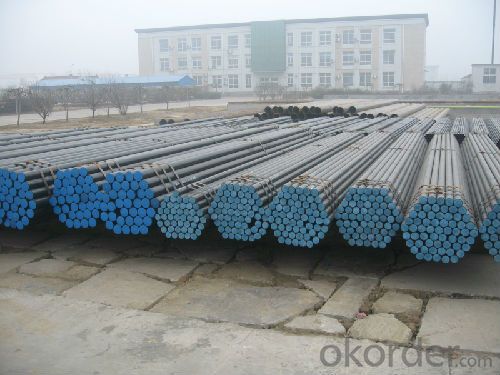
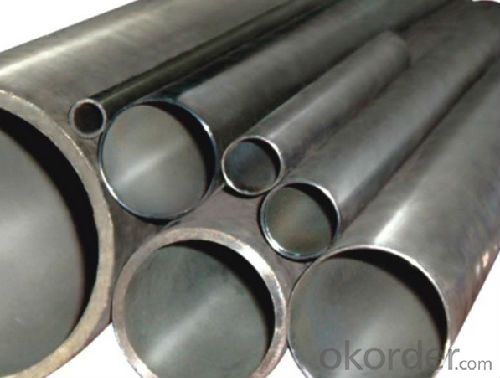
- Q: Are stainless steel pipes suitable for pharmaceutical laboratories?
- Stainless steel pipes are a suitable option for pharmaceutical laboratories. They are widely used in the pharmaceutical industry because of their exceptional resistance to corrosion, high strength, and durability. These pipes are also highly hygienic and easy to clean, making them perfect for pharmaceutical laboratories where cleanliness and sterility are crucial. Moreover, the smooth internal surfaces of stainless steel pipes prevent the buildup of bacteria, contaminants, or particles. Additionally, stainless steel is non-reactive and does not release any harmful substances, ensuring the quality and safety of pharmaceutical products. Overall, stainless steel pipes are a dependable choice for pharmaceutical laboratories as they fulfill the strict requirements for cleanliness, durability, and product safety.
- Q: Can stainless steel pipes be used for natural gas systems?
- Yes, stainless steel pipes can be used for natural gas systems. Stainless steel is highly resistant to corrosion and can withstand high pressure and temperature, making it a suitable material for transporting natural gas. The smooth inner surface of stainless steel pipes also allows for efficient gas flow, minimizing the risk of blockages or obstructions. However, it is important to ensure that the stainless steel pipes used meet the specific standards and codes required for natural gas systems to ensure safety and compliance.
- Q: Can stainless steel pipes be used for oil refinery applications?
- Yes, stainless steel pipes can be used for oil refinery applications. Stainless steel is widely used in the oil and gas industry due to its excellent corrosion resistance properties, high strength, and durability. Oil refineries deal with harsh and corrosive environments, including high temperatures, pressure, and exposure to various chemicals. Stainless steel pipes can withstand these conditions and offer long-lasting performance. Stainless steel pipes are resistant to corrosion caused by acidic and alkaline substances, which are commonly found in oil refinery operations. They also have good resistance to pitting and crevice corrosion, making them suitable for handling crude oil, petroleum products, and other corrosive media. Furthermore, stainless steel pipes can handle high temperatures without losing their strength and integrity. This is important in oil refineries where processes involve heating and cooling operations. In addition to corrosion resistance and high-temperature capabilities, stainless steel pipes also provide excellent mechanical properties. They are strong, durable, and have good weldability, making them suitable for the demanding conditions of oil refinery applications. Overall, stainless steel pipes are a reliable choice for oil refinery applications due to their corrosion resistance, high-temperature capabilities, and mechanical properties. They ensure the safe and efficient transportation of oil and petroleum products, contributing to the smooth operations of oil refineries.
- Q: What are the common applications of stainless steel pipes in the construction industry?
- Stainless steel pipes are commonly used in the construction industry for various applications such as water and gas supply systems, heating and ventilation systems, structural supports, and exterior cladding. They are preferred for their corrosion resistance, durability, and strength, making them suitable for both indoor and outdoor construction projects.
- Q: Are stainless steel pipes suitable for oil refineries?
- Stainless steel pipes, known for their high resistance to corrosion, prove to be a suitable choice for oil refineries. This is particularly important in environments abundant with corrosive substances like crude oil and various chemicals involved in refining procedures. Moreover, stainless steel pipes possess the ability to withstand both high temperatures and pressures, thus making them the perfect means for transporting oil and gas within the refinery. In addition to this, the low maintenance requirements and long lifespan of stainless steel pipes reduce the frequency of replacements, resulting in minimal downtime. In conclusion, stainless steel pipes offer the durability, reliability, and corrosion resistance necessary to meet the demanding conditions of oil refineries.
- Q: What is the difference between 304J3 and 316J3 stainless steel pipes?
- The main difference between 304J3 and 316J3 stainless steel pipes lies in their composition and corrosion resistance properties. 304J3 stainless steel is a grade of stainless steel that contains 18% chromium and 8% nickel. It is known for its excellent corrosion resistance, high strength, and good formability. This grade is commonly used in various applications, such as food processing, chemical processing, and architectural applications. On the other hand, 316J3 stainless steel is a grade that contains 16-18% chromium, 10-14% nickel, and 2-3% molybdenum. This additional molybdenum content enhances its corrosion resistance, especially against chloride environments. As a result, 316J3 stainless steel is often used in more demanding applications, such as marine environments, pharmaceutical equipment, and coastal structures. In summary, the key difference between 304J3 and 316J3 stainless steel pipes is the composition and the subsequent corrosion resistance properties. While both grades offer good corrosion resistance, 316J3 stainless steel provides superior resistance in chloride-rich environments, making it suitable for more demanding applications.
- Q: Can stainless steel pipes be used for mining and mineral processing applications?
- Yes, stainless steel pipes can be used for mining and mineral processing applications. Stainless steel is known for its excellent corrosion resistance, which makes it highly suitable for use in environments where there is exposure to chemicals, acids, and high temperatures, all of which are common in mining and mineral processing operations. Stainless steel pipes offer several advantages in these applications. Firstly, their resistance to corrosion ensures that they can withstand the harsh conditions present in mining and mineral processing, thereby reducing the risk of pipe failure and minimizing maintenance and replacement costs. Additionally, stainless steel pipes are highly durable and have a long lifespan, making them cost-effective in the long run. Furthermore, stainless steel pipes are non-reactive and do not contaminate the materials being transported, which is crucial in mining and mineral processing where the purity of the products is essential. This makes stainless steel pipes suitable for conveying various minerals, ores, and chemicals without compromising their quality or causing contamination-related issues. Another advantage of stainless steel pipes is their versatility. They can be manufactured in various sizes, shapes, and thicknesses to meet the specific requirements of mining and mineral processing applications. Additionally, stainless steel pipes can be welded, threaded, or coupled to easily connect with other components and systems, allowing for efficient installation and integration into existing infrastructure. In conclusion, stainless steel pipes are well-suited for mining and mineral processing applications due to their corrosion resistance, durability, non-reactivity, and versatility. They offer a reliable and cost-effective solution for conveying various materials in a demanding environment while maintaining the integrity and purity of the products being processed.
- Q: What is the difference between 430 and 316 stainless steel pipes?
- The composition and properties of 430 and 316 stainless steel pipes differ significantly. 430 stainless steel, a ferritic stainless steel, contains chromium, providing it with good corrosion resistance. However, its resistance to corrosion falls short of that of 316 stainless steel. Furthermore, it has a lower nickel content compared to 316 stainless steel. In contrast, 316 stainless steel is an austenitic stainless steel that encompasses both chromium and nickel. It boasts exceptional corrosion resistance, rendering it suitable for a wide range of applications, particularly in marine environments where exposure to saltwater and other corrosive substances occurs. Additionally, it possesses superior tensile strength and creep resistance in comparison to 430 stainless steel. In terms of appearance, 430 stainless steel features a dull, brushed finish, whereas 316 stainless steel boasts a bright, reflective finish. Given these disparities, the selection between 430 and 316 stainless steel pipes hinges upon the specific application and the desired level of corrosion resistance.
- Q: Are stainless steel pipes suitable for chemical storage tanks?
- Yes, stainless steel pipes are suitable for chemical storage tanks. Stainless steel is highly resistant to corrosion, making it an ideal choice for storing and transporting chemicals. It can withstand exposure to various chemicals, acids, and alkalis without deteriorating or contaminating the stored substances. Additionally, stainless steel pipes have high tensile strength and can withstand high pressure, making them a reliable option for chemical storage tanks that require durability and safety.
- Q: Can stainless steel pipes be used for irrigation well systems?
- Yes, stainless steel pipes can be used for irrigation well systems. Stainless steel is highly resistant to corrosion and can withstand various environmental conditions, making it a suitable choice for irrigation applications. Additionally, stainless steel pipes offer long-term durability and maintain the quality of water being transported, ensuring efficient irrigation system performance.
Send your message to us
PVC Coated Stainless Seamless Steel Tube
- Loading Port:
- Tianjin
- Payment Terms:
- TT or LC
- Min Order Qty:
- 25 m.t.
- Supply Capability:
- 10000 m.t./month
OKorder Service Pledge
OKorder Financial Service
Similar products
Hot products
Hot Searches
Related keywords
